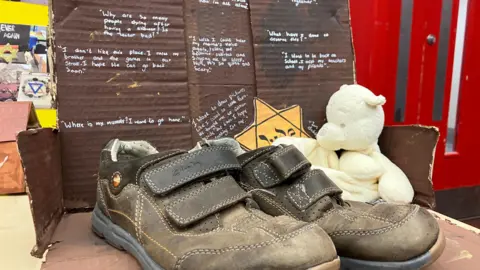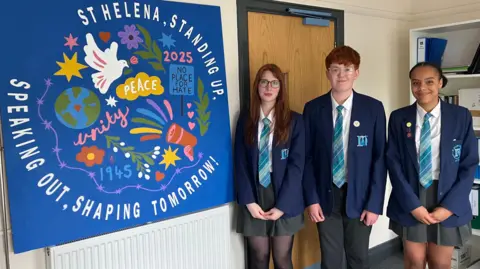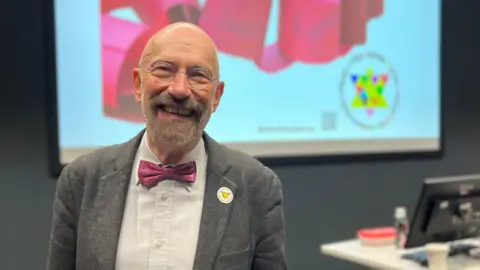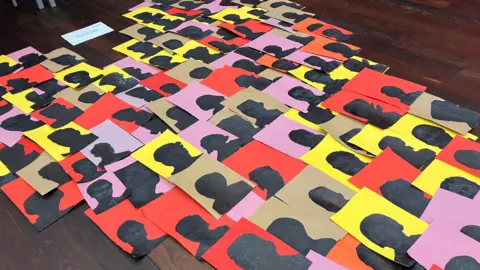Schoolchildren showcase anti-hate projects
 Jon Wright/BBC
Jon Wright/BBCHigh school pupils have been presenting creative projects inspired by Holocaust education and aimed at tackling prejudice and discrimination.
The Dora Love Prize is named after a Jewish Holocaust survivor from Lithuania who settled in Colchester, and worked to promote tolerance and understanding.
Six high schools from Suffolk and four from Essex presented their work at the University of Essex on 23 June, with videos sent from a school in Dartford in Kent, and one from Canada.
Alde Valley Academy in Suffolk, were the 2025 winners, using QR codes on posters to share interviews with people who had faced discrimination.
 Jon Wright/BBC
Jon Wright/BBCIt is the 14th time the prize has run, with winners receiving a £300 cheque to help with anti-discrimination education.
Northgate High in Ipswich and the Gilbert School in Colchester were the two runners up, receiving £100 each.
Fabija, 13, from Alde Valley, in Leiston, said: "For our presentation, Not a Statistic, we interviewed members of ISCRE [Ipswich and Suffolk Council for Racial Equality] and members of our school, about what diversity means to them, how it feels to be discriminated against.
Sorrel, 15, also from Alde Valley, said: "We've all learned a lot. It's always good to win something as it is encouragement. We'll go back to school and encourage kids to do it next year."
 Jon Wright/BBC
Jon Wright/BBCSt Helena school in Colchester won the prize in 2024.
This year its children created a 25-minute film called The Importance of Knowing, which was screened earlier in the month at the city's Firstsite art gallery.
Helena, 13, said: "We wanted to share with people what discrimination is and how it affects different people of all ages, all races, all sexualities and how they live it every day."
Isla, 14, said: "We talked to as many different groups and people with different backgrounds as we could, and we asked them how they deal with discrimination, why they think that safe spaces are important."
Donovan, 14, added: "With the internet, anyone can be discriminated against anywhere, anytime.
"[Social media] can spread positivity and information and learning, but also it just needs to be moderated more because of all the hate going around, especially at the moment."
 Jon Wright/BBC
Jon Wright/BBCRainer Schulze is an emeritus professor at the Department of History and Human Rights Centre and the University of Essex.
The university originally hosted the prize, but this year it became a stand-alone charity.
Prof Schulze met Dora Love in the early 2000s in Colchester.
"We had an immediate connection. She was a Jewish Holocaust survivor who always put the emphasis on the fact that it was not only Jews that were persecuted, but a whole range of other groups as well because of who they were," he told BBC Essex.
"This included the Roma and Sinti, often known as Gypsies, gay men, Jehovah's Witnesses, disabled people, and many more.
"I find if you don't point out that the overall aim of Nazi ideology was to create a homogenous society where everyone was alike - a frightening thought - then you miss a trick in Holocaust education.
"If you talk about homogenizing society, then you get the young people because they understand they've been, or some of them have been, undergoing the same pressure of fitting in, of being discriminated of who they are."
 Jon Wright/BBC
Jon Wright/BBCFollow Suffolk news on BBC Sounds, Facebook, Instagram and X.
